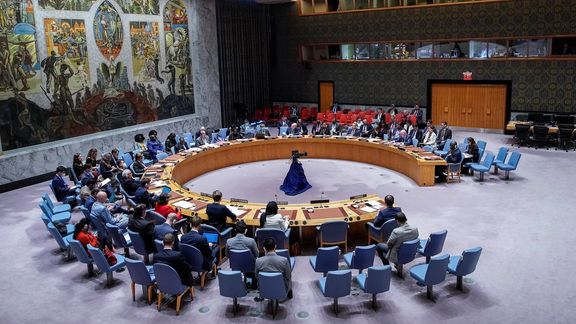Differences On Iran Flare At UN Security Council

Monday’s meeting of the UN Security Council to discuss the 2015 resolution endorsing the Iran nuclear agreement exposed the complex divisions surrounding it.

Monday’s meeting of the UN Security Council to discuss the 2015 resolution endorsing the Iran nuclear agreement exposed the complex divisions surrounding it.
Expressing irritation with United Nations Secretary-General Antonio Guterres over an investigation into Iran sending military drones to Russia, United States Deputy Ambassador Robert Wood told the meeting the UN was “apparently yielding to Russian threats” by not sending officials to Ukraine.
UNSC members France, the United Kingdom, and the US have argued that Iran supplying drones to Russia violates a clause in UNSC Resolution 2231, which endorsed the 2015 nuclear deal. The clause requires prior council approval (up to October 2023) for transferring to and from Iran of certain categories of weapons.
Amir Saeid Iravani, Iran’s UN ambassador, said any drones supplied to Russia before February were not banned by the council and were not “for use in the ongoing conflict in Ukraine.” He said the UN enquiry served only “to divert attention from the western states’ transfer of massive amounts of advanced sophisticated weaponry to Ukraine in order to prolong the conflict.” The US alone has sent $20 billion in arms to the Kyiv government.
Iran has not criticized Russia for its unprovoked attack on Ukraine, while the United States and its European NATO allies have strongly opposed Moscow on the issue and are helping Kyiv to reclaim its territorial integrity.
Vassily Nebenzia, Russia’s UN ambassador, told the council that UN officials “should not bow to pressure from western countries” and that “any results of this pseudo investigation [would be] null and void.”
The UNSC meeting marks a growing rift between, on one side, the US, France, and the UK, and on the other side Russia, who alongside China mainly blames Washington for undermining the 2015 agreement, the JCPOA (Joint Comprehensive Plan of Action), which the US unilaterally left in 2018 while imposing stringent sanctions on Iran.
A statement Monday from the three western European JCPOA signatories – France, Germany, and the UK – reiterated that the failure of talks to revive the agreement was solely due to Iran. Their statement said Tehran had “refused to take the deal tabled” by the “JCPOA co-ordinator in March and August,” referring to proposals made by the European Union chair of talks, which Iran regarded as unsatisfactory. The continuing expansion of Iran’s nuclear program was having “severe impacts on international security and the non-proliferation regime,” the ‘E3’ statement said.
JCPOA ‘still the best option’
The EU, whose officials have mediated not just multilateral JCPOA talks but also bilateral Iran-US contacts, now appears more proactive than the E3 over the JCPOA – flying in the face of US President’s Joe Biden just-revealed November proclamation that the JCPOA is “dead.”
EU foreign policy chief Josep Borrell met Tuesday in Jordan with Iranian Foreign Minister Hossein Amir-Abdollahian and chief nuclear negotiator Ali Bagheri Kani. Silvio Gonzato, the EU Chargé d’Affaires, told the UNSC Monday that “diplomacy and restoring the JCPOA’s full implementation” were “still the best option for preventing Iran from developing a nuclear weapon,” and that this was “instrumental to the security of the whole region and…in our fundamental common interest.”
While acknowledging that JCPOA restoration work had been “seriously challenged” by unrest in Iran and the drones supply, Gonzato said the EU “remains in close contact with all JCPOA participants and the United States.”
And while Gonzato noted Iran’s JCPOA infringements, including enriching uranium to 60 percent and limiting international inspectors’ access, Gonzato cited the “very serious negative economic consequences” Iran faced “following the US’s withdrawal from the JCPOA” its “re-imposition of previously lifted US unilateral sanctions, which we deeply regret.”
In Washington Saturday, Mike Pompeo, Secretary of State as President Donald Trump left the JCPOA told a conference there should be no diplomacy with “a brutal and corrupt regime.” Addressing the conference virtually, Maryam Rajavi, co-leader of the Mujahideen-e Khalq, the militant opposition group relocated by the US from Iraq to Albania, said “the current uprising in Iran is one of the world’s most important developments in 2022.”